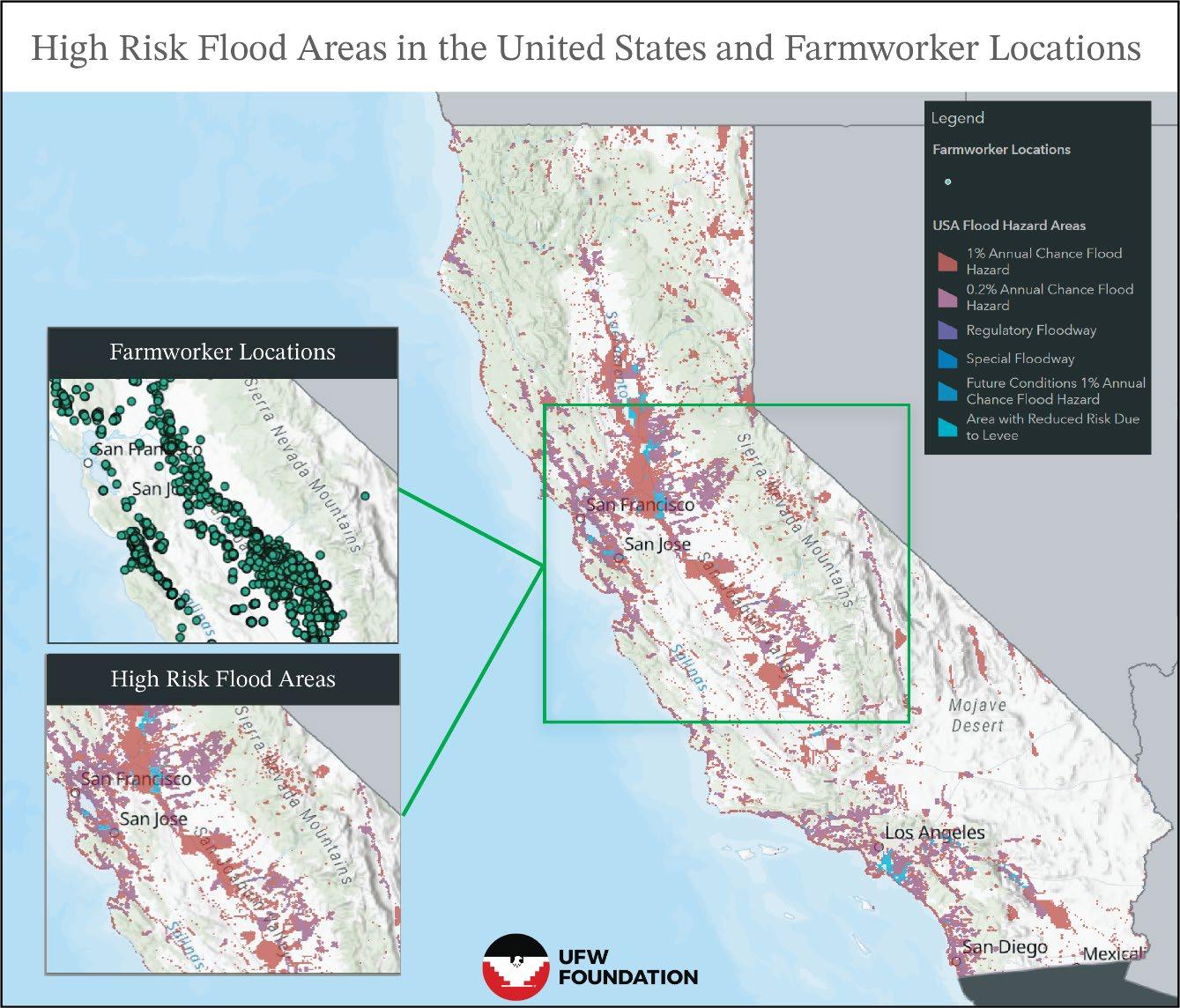




Climate change significantly impacted California in early 2023 with a series of historic storms that caused damage to not only farm workers and their homes but also their ability to work. These storms brought flooding, heavy rain, power outages and landslides. Storm flooding began in January, hitting Ventura County and over the next three months, the continued torrents of rain resulted in widespread flooding of thousands of acres of farmland.
In response to the recent floods and extreme weather in California rural communities, the UFW Foundation conducted a survey to assess the impact on farm workers. This report presents the results of the Climate Change Survey collected over three days.

Through the use of advanced data analytics and the leveraging of its technological tools, the UFW Foundation continues its mission to serve as the voice for a population that goes largely unheard. The purpose of this study was to collect data on the impact these storms had in rural areas, including farm workers and immigrant populations. The survey sought to gather feedback directly from community members within the UFW Foundation’s subscription platform and exhibit the results through a non-filtered, unbiased approach.
Background:
The UFW Foundation currently utilizes a text messaging software for SMS as a method of communication and engagement with their subscribers. Constituents that desire to receive information from the UFW Foundation or get further involved have the ability to optinto the texting program at any time and become an active subscriber. On a weekly basis, broadcasts are sent out in an effort to continuously inform constituents of legislative efforts, resource availability, and advocacy campaigns currently being
employed. The UFW Foundation successfully used this strategy during the pandemic to implement several surveys, including a Health Survey in California and Washington, and a COVID-19 Vaccination Survey.

As the UFW Foundation’s platform continued to grow, voluntary surveys have been used to gather data on active subscribers to better tailor emergency resource distribution efforts, identify unique demographics, and further strengthen advocacy efforts. The UFW Foundation sent out a survey via its text messaging software to active subscribers within California over three days on Friday, March 24th, 2023. The survey contained 11 questions.
This survey was designed specifically to gather data on the effects of climate change on farm workers due to recent historic storms. Skip logic was employed to ensure an accurate representation of each individual’s experience. This feature allowed us to change which question a respondent saw next based on their answer to the current question. We anticipated that some questions might not apply to all respondents and therefore skip logic allowed for respondents to not receive questions that did not pertain to them.
Our survey of 11 questions was sent out to active subscribers within California equaling to 65,932 recipients. Sixteen thousand five hundred and forty-three (16,543) people responded to at least one question of the survey putting our response rate at 25%. OF these, nearly fifteen thousand (15,000) self-identified as farm workers.

Our findings suggest the ability to work has been significantly affected by these recent historic storms.
• 88% (n=14,498) of respondents work in agriculture.
• 96% (n=15,178) farm workers reported their ability to work was significantly impacted by the recent storms.
• 53% (n=7,978) reported having lost more than 1 month of work due to the rain.
• The majority of respondents 81% (n=11,814) reported that they have not received any of the following resources (food, emergency shelter, rent/mortgage assistance, or USDA FFWR)
• 30% (n= 4,500) of respondents were unsure whether there was an evacuation order for their region
• A little over a quarter reported their homes were damaged by the rain. 27% (n=3,952)
• The majority did not leave their homes due to the rain. Specifically, 91% (n=13,185)
o Of those that did report they left their homes, the majority moved in with friends/family. (n=1,472)
• When asked what worried them the most the majority mentioned their job followed by their ability to pay their rent.
• Responses by Cities – Top 5 included:
o Oxnard: 12%
o Salinas: 9%
o Bakersfield: 7%
o Fresno: 6%
o Madera: 5%


The human toll of these events is still being assessed but there is growing concern that farm workers will take the biggest hit as they are traditionally excluded from state and federal relief programs due to their immigration status. Loss of wages for an already economically vulnerable population is a concern voiced by many workers as they try to find work, pay rent and feed their families. A historic snowpack in the Central Sierra Nevada is also fueling concerns of severe flooding as the snow melts, especially in the Tulare and San Joaquin River basins. While the continued saturation of rivers and streams might delay the onset of California’s wildfire season, the excessive growth of foliage and downed trees and limbs can become fuel for fires later in the year.
One thing that is certain, is that climate change will continue to negatively impact California farm workers as they cope with extreme heat events, wildfires and now torrential rain and flooding.
